Challenging Every Learner Every Lesson Every day
Quality of Education
Overview
At Horizon our vision is to develop students who are ‘School ready; Work ready; Life ready’.
We deliver this vision through
- the quality of education students experience
- the behaviour and attitudes students develop
- the personal development opportunities students enjoy.
Curriculum (Intent)
Our curriculum aims to provide an education which enriches students’ ambitions and love of learning and equips them with the skills, knowledge and cultural capital they need to access aspirational post-16 pathways and the responsibilities and experiences of later life. It underpins everything we do as a college, challenging and supporting students in their academic, social and moral development.
Subjects at Horizon then have their own individual curriculum intents with long-term curriculum plans that outline
- the key subject-specific strands they are developing
- how their learning journey is sequenced, spiralled and/or interleaved across years 7-11.
Schemes of learning and individual lesson plans then detail when and how this learning will take place.
Curriculum STRUCTURE
At Horizon, students follow a 3 year Key Stage 3 (Years 7, 8 and 9) and a 2 year Key Stage 4 (Years 10 and 11). At the end of Year 9, students opt for subjects they will study in Years 10 and 11, which they complete at the end of Year 11.
Across Years 7, 8 and 9 students study a total of 18 subjects – the aim being to broaden their horizons and develop specialists across a range of disciplines. At the heart of this curriculum sit the Ebacc subjects of English (Language and Literature), Maths, Science, Geography, History and French or Spanish. Students also study PE, RE, Computing and Citizenship, as well as a wide range of more creative subjects: DT (Graphics, Textiles, Resistant Materials), Cooking and Nutrition, Art, Drama, Dance and Music.
Across Years 10 and 11, students further develop their specialist knowledge but also prepare for GCSE and Vocational exams. The Ebacc subjects once again sit at the heart of their curriculum, all students studying GCSE English Language and English Literature, Maths, Science (either in the form of Combined Sciences or Separate Sciences) and Geography or History. The majority also continue to study a Modern Foreign Language. Students are then able to choose from a wide range of option subjects, both creative and academic, to suit individual preferences and future career aspirations. All students continue to study PE and Core RE.
Teaching and learning (Implementation)
Our Quality of Education mantra of ‘challenging every learner, in every lesson, every day’ ensures every student knows more, remembers more and can do more.
We develop this to ensure the highest quality of classroom practice and the most effective delivery of our curriculum. Our pedagogical approach, individualised and developed at subject level, is based on:
- Ambitious academic goals and positive relationships
- Explanation and modelling
- Questioning, retrieval and discussion
- Responsive teaching (be ready to go back as well as forwards)
- Independent practice and scaffolding
- Growth mindset and metacognition
We develop a culture of reading – for understanding, for knowledge and for pleasure, to ensure students are able to successfully access their learning across all subjects and widen their understanding of the world around them.
We use formative and summative assessment to systematically check for understanding, to inform future planning and to support students in maximising their academic potential.
Outcomes (Impact)
Our students achieve well, taking pride in the work they produce and achieving outcomes considerably above the national average. They leave us with the character and skill set they need to flourish in the next stage of their education, employment or training.
Meet the Team
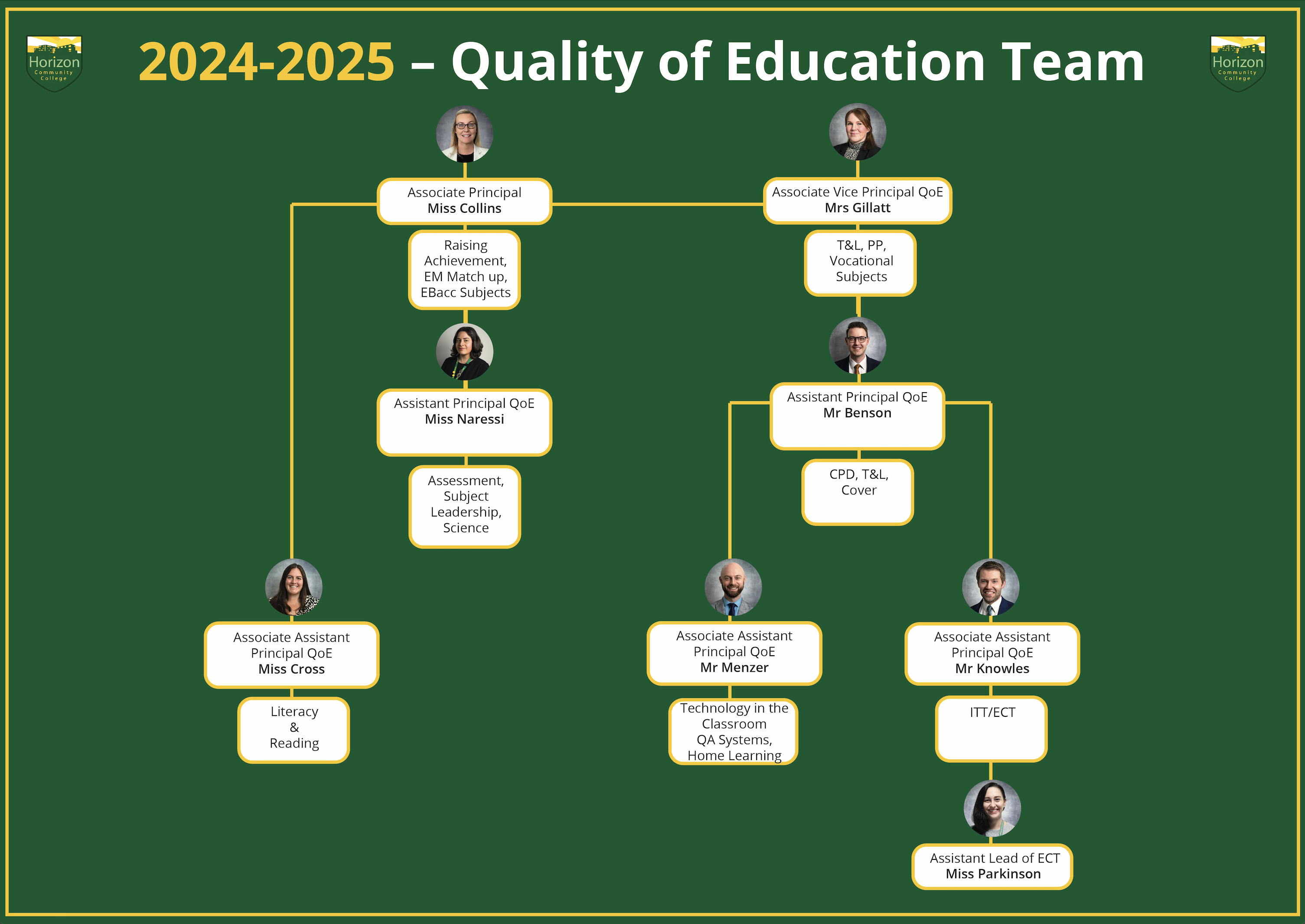
OUR CURRICULUM
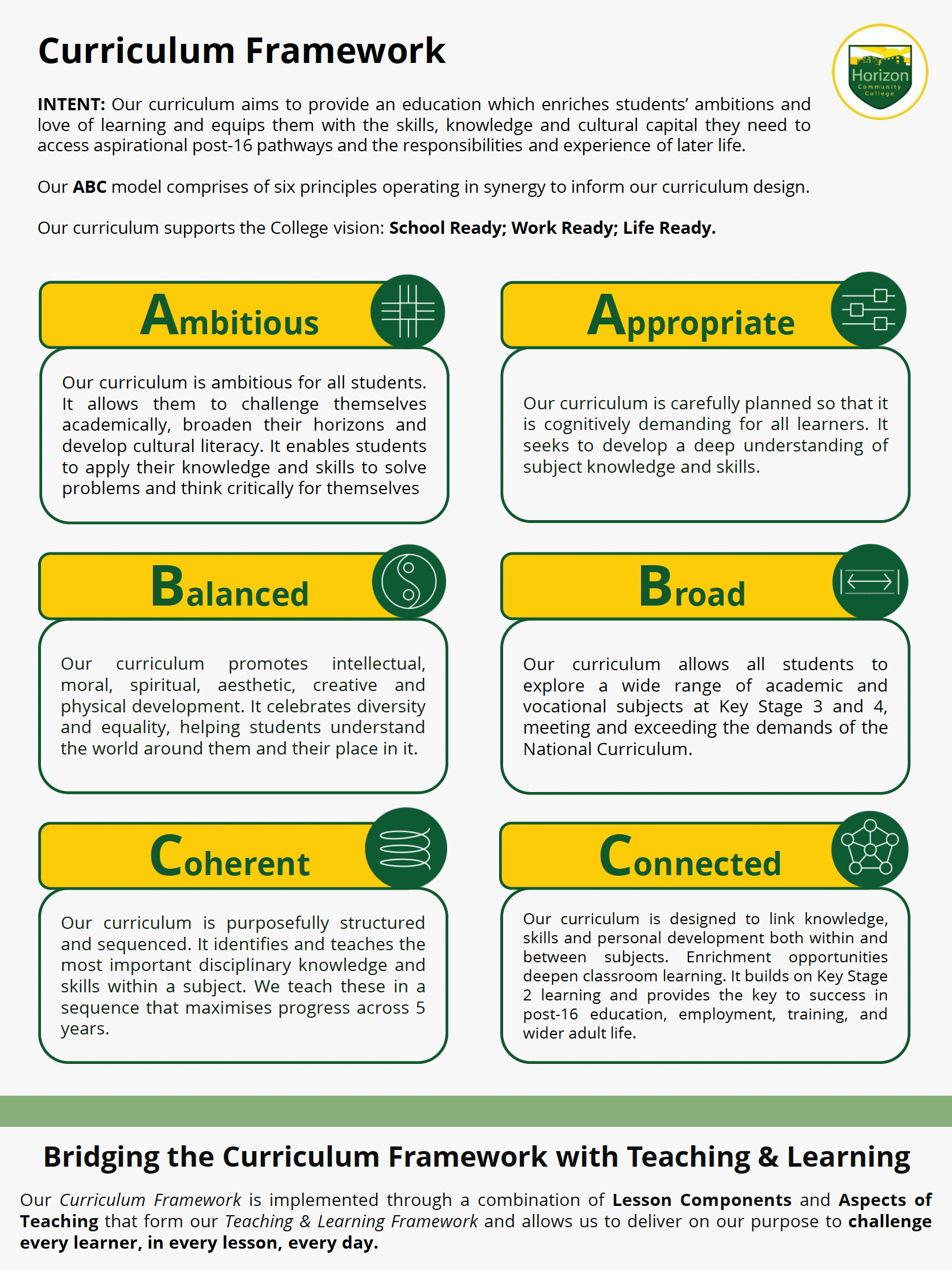
What are students learning this half term?
SUBJECTS
Teaching & Learning
Challenging every learner every lesson every day
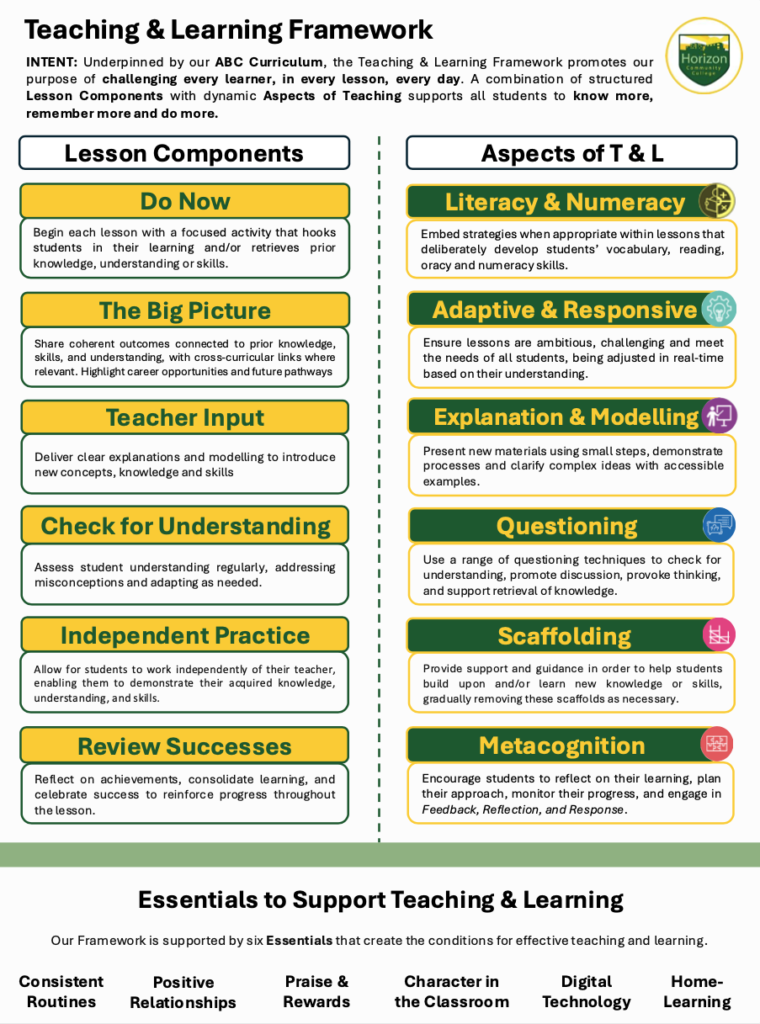
Assessment and Reporting
Assessment, in all forms, is an important part of any learner’s academic journey and goes far beyond national and end of year exams. At Horizon, a variety of assessment is used throughout the year to help students and their teachers identify progress being made and areas for development.
Assessment falls in to two categories: Assessment for Learning (Formative) and Assessment of Learning (Summative). Formative Assessment is described by William and Black as “encompassing all those activities undertaken by teachers, and/or by their students, which provide information to be used as feedback to modify the teaching and learning activities in which they are engaged”. Formative assessment at Horizon is low stakes and implemented through home learning, teacher questioning and regular progress checks, which check on-going learning. Summative assessments are a more formal way to help us understand learners’ progress over time and take place during summative assessment weeks throughout the year. These support a wider understanding of the long-term impact of the curriculum and enable students to identify next steps on their journey towards meeting their targets.
Summative Assessment Weeks
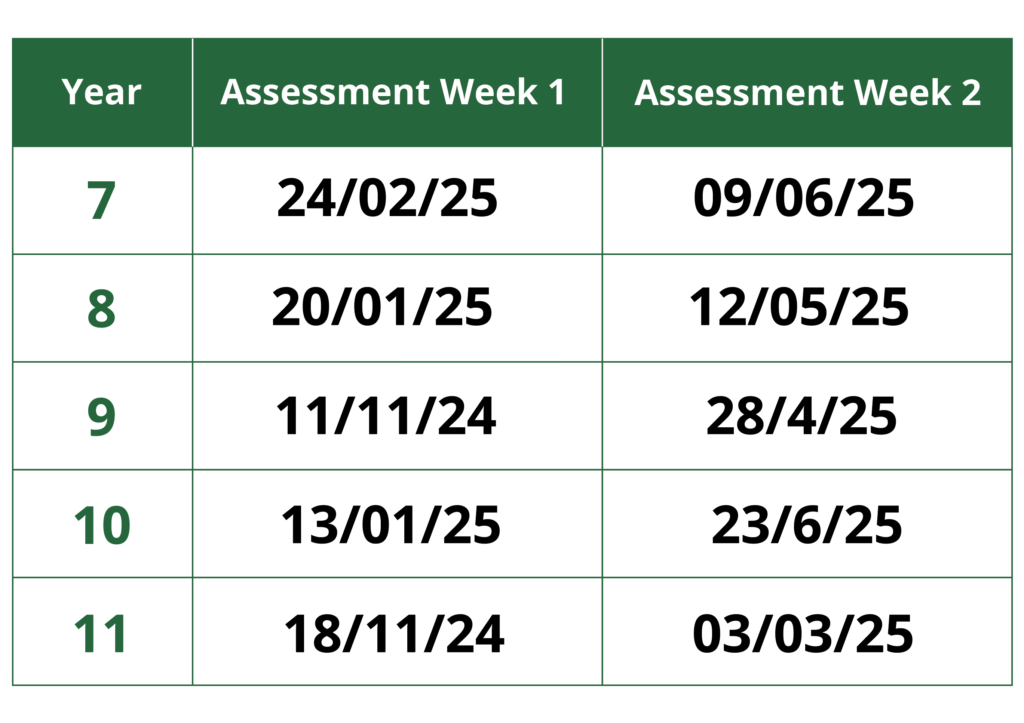
Students are set academic targets based on Key Stage 2 performance, or baseline testing where this is not available. At Key Stage 3, they are given a single target across all subjects; this can be either:
- Approaching Standard
- Approaching Standard Plus
- Age Related
- Age Related Plus
- Greater Depth
- Greater Depth Plus
At Key Stage 4, they are set an individual target for each subject; this can be either a GCSE or Vocational grade. Each target represents the minimum a student should be aiming to achieve in that subject at the end of the key stage and gives them a reference point against which to measure their progress.
Please see the link for our assessment and feedback policy.
Parents receive a Progress Report twice a year. This provides details of each student’s academic achievement but also their effort within lessons. Effort grades are awarded using the criteria below:

Literacy (Reading)
Effective literacy skills not only underpin learning but also provide a springboard for success in both career and life choices. At Horizon, for the academic year 2024-25, we have chosen to focus on both reading and oracy, believing that this will support students to access all areas of the curriculum successfully, overcome barriers to learning and encourage a positive attitude to college life.
At Horizon we have a number of key priorities for Literacy for the academic year 2024 – 2025.
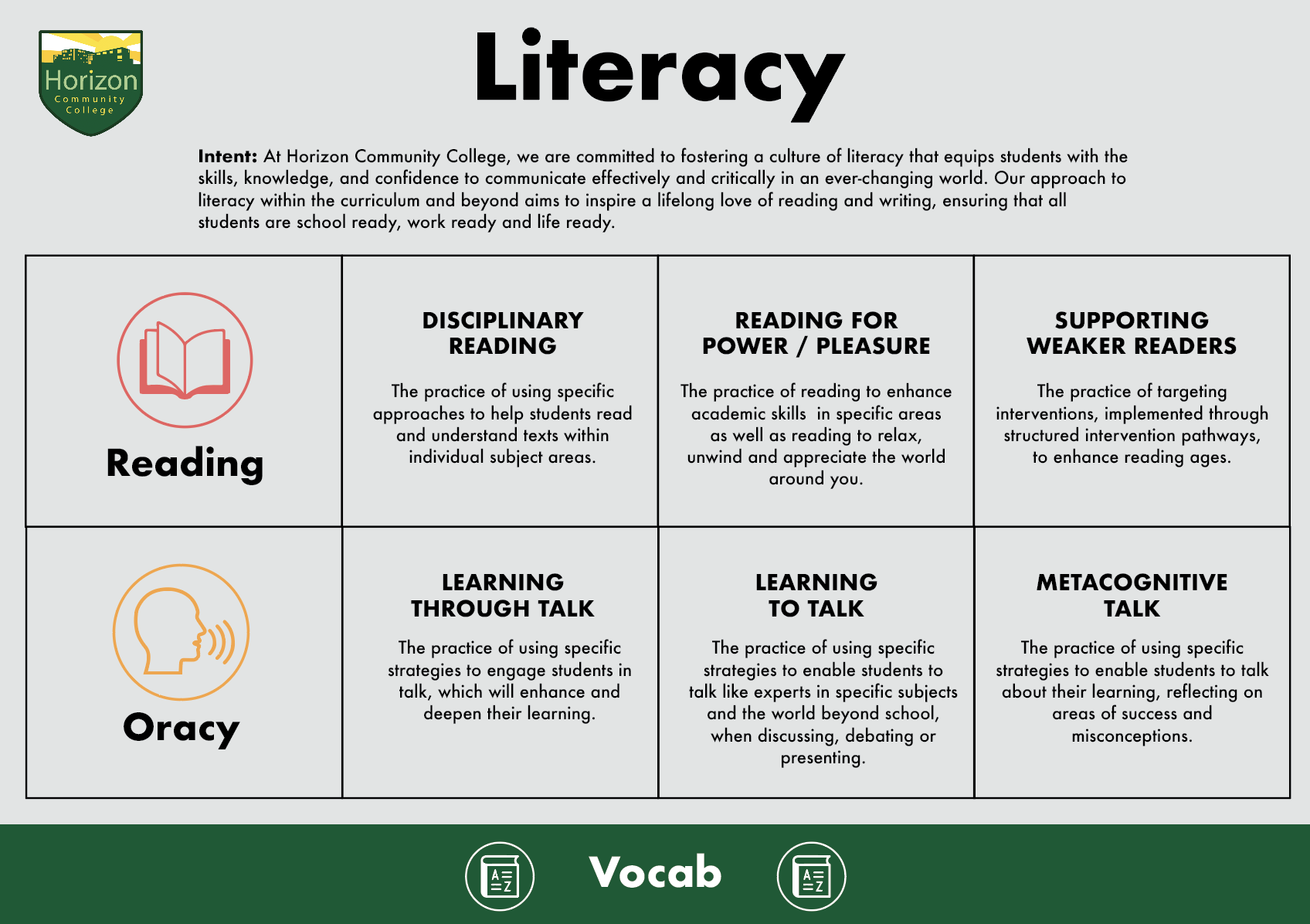
What does this mean for our students
In lessons:
There is a focus on disciplinary literacy.
Teachers use NGRT* data to inform their teaching.
Students in year 7, 8 and 9 have access to an online platform called Sparx Reader. Via this personalised reading platform, students develop their vocabulary, fluency and comprehension skills. This is set bi-weekly as their English home-learning.
Teachers plan opportunities for structured talk.
We support students who are reading significantly below their chronological age by:
Obtaining reading ages using NGRT*
Complete further screening to determine their intervention pathway.
Offering four intervention pathways: speech and language, phonics, fluency, comprehension.
Beyond the classroom:
National reading events such as World Book Day and National Poetry Day ae celebrated annually.
Guest authors work with us providing writing workshops.
Students have access to the library before school, at break time, at lunchtime and after school everyday.
Our designated librarian works with departments to encourage students to read a wide range of texts linked to curriculum topics.
The library is well stocked and updated regularly to include a wide range of fiction and non-fiction titles, such as new releases and graphic novels.
Students achievements are celebrated with designated library time.
Students have opportunities to enter national writing competitions.
Students are encouraged to read a wide range of genres through our in-school initiative called Reading Journeys.
We offer students opportunities to develop both their exploratory talk and presentational talk (votes for schools / guest speakers / debate club / mock interview day).
*NGRT data is collected in year 7. Students who undergo intervention are reassessed at regular intervals.
What does this look like in the classroom?
Staff use a range of strategies as part of our reading quick wins to develop reading in the classroom. Examples of these are reading non-negotiables, echo reading, paired reading, modelling reading, frayer models and glossaries.
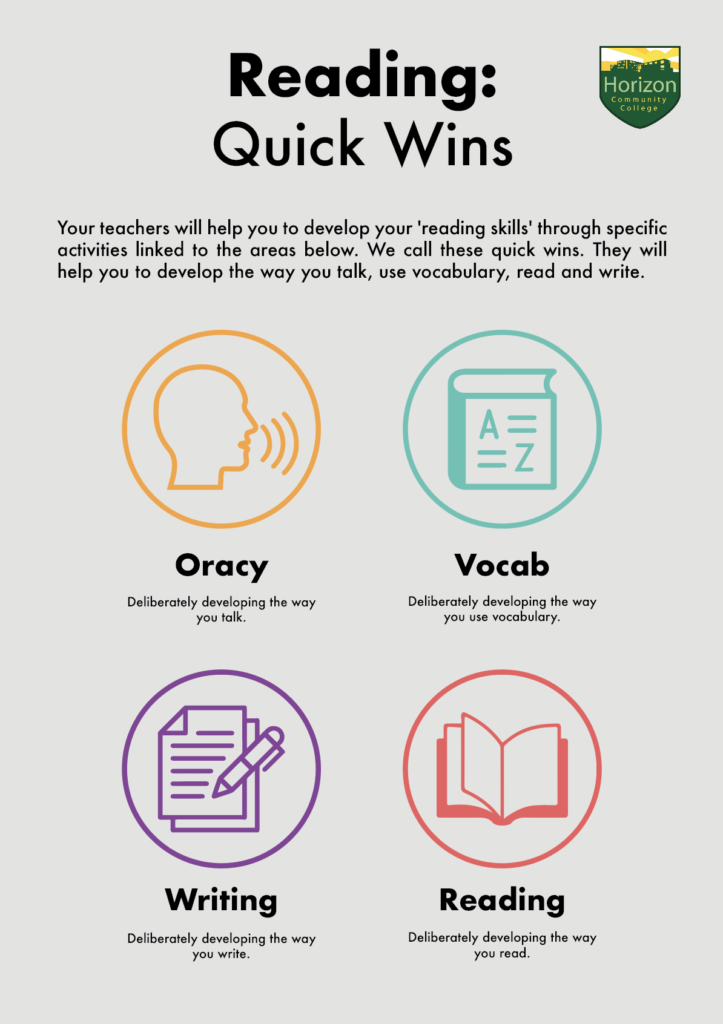
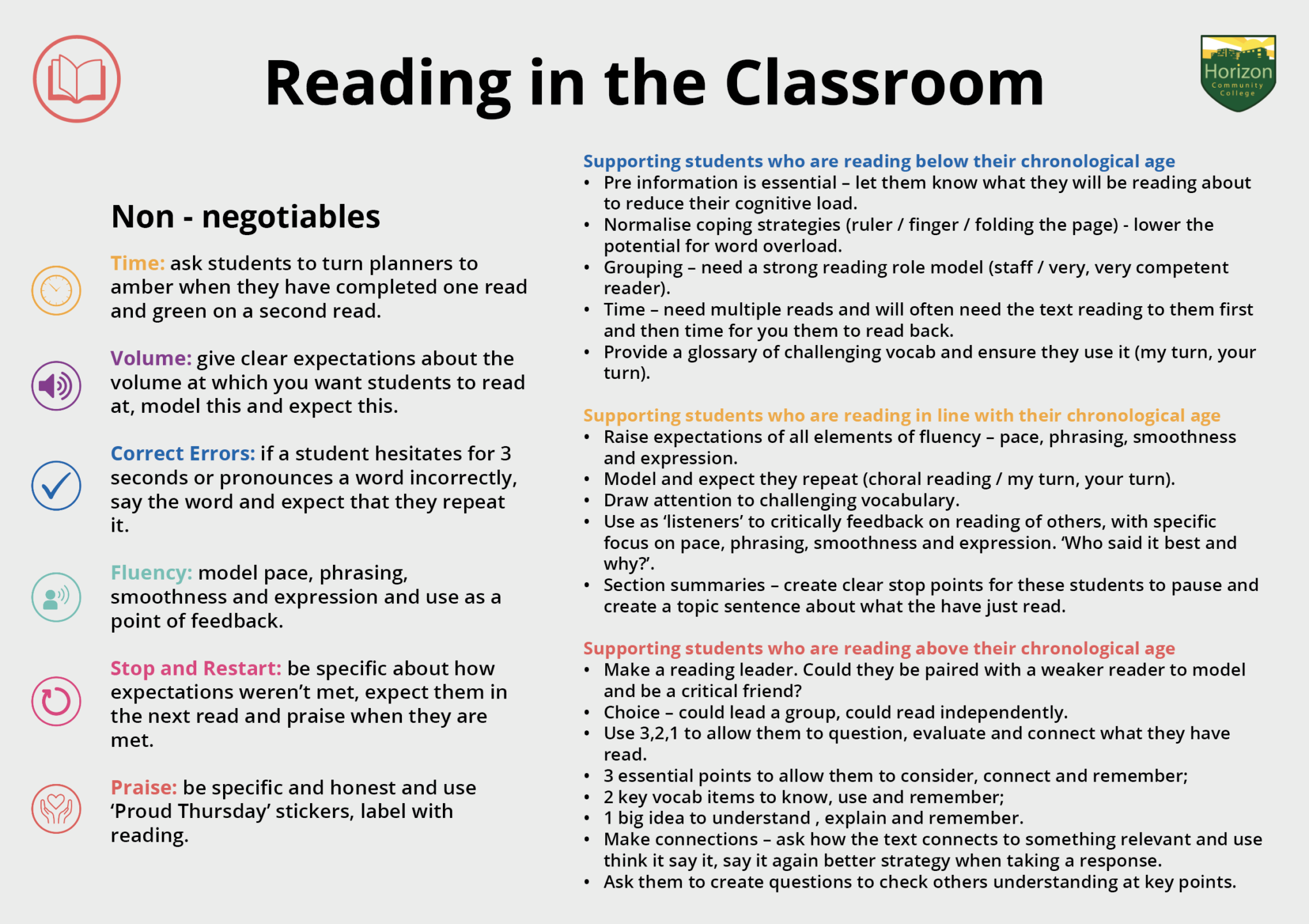
Staff are building a bank of strategies to develop oracy in the classroom. Initially these are:
- TALK rules
- Talk Tactics
- Concept Cartoons
- Yes…But
- Verbal Drafting
- Sixty Seconds
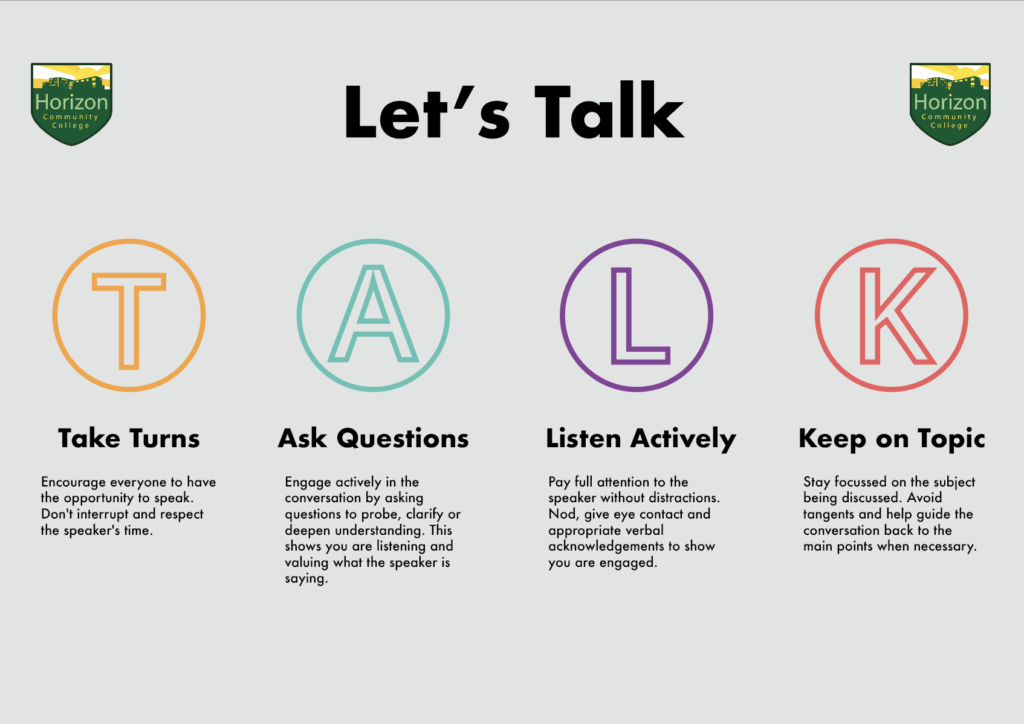
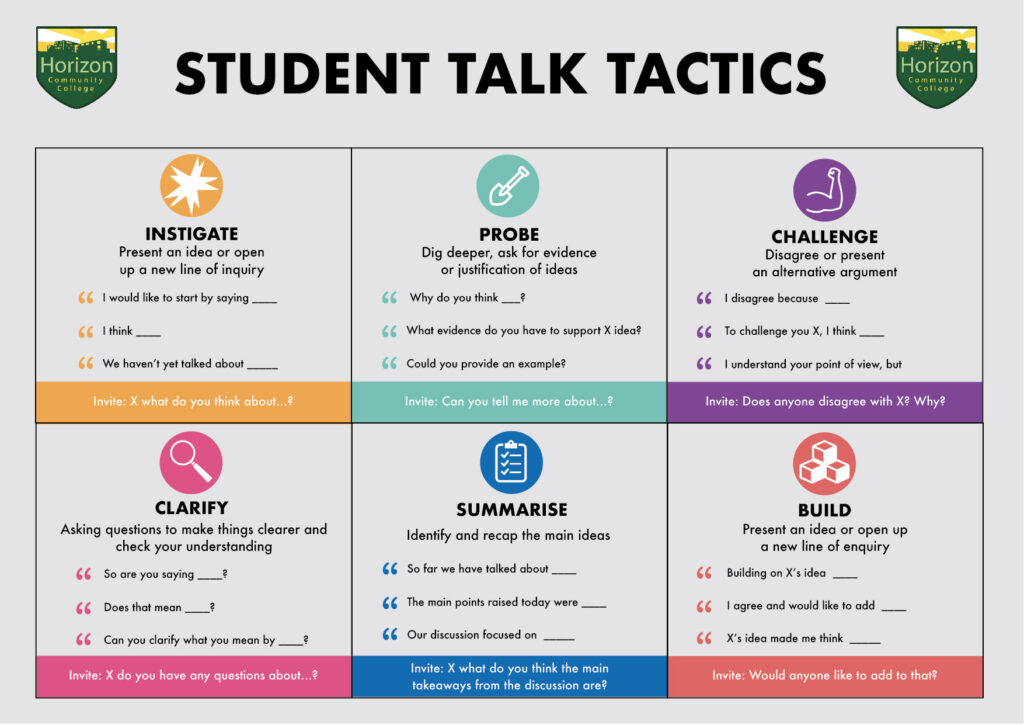
Numeracy
We believe that everyone should be taught the numeracy skills that will enable them to be successful across the curriculum, in the career they choose and in managing their personal finances in everyday life.
At Horizon, we take a ‘no tricks’ approach to the teaching of numeracy, wherever mathematical content appears across the curriculum, especially in Geography, Business or Physics. Whenever a student is taught a mathematical concept, our Corporate Methods Guide is developing a consistent approach, regardless of the year group a student is in or the subject they are learning, to reinforce understanding and develop fluency.
We are committed to helping students appreciate the value of numeracy beyond the classroom. For example, our Financial Awareness Week shows students how to apply mathematical skills they have been taught to an array of everyday contexts. These were chosen with the context of our community in mind, as well as covering day-to-day budgeting, understanding student loans, owning a credit card, buying a car and taking out a mortgage.
Home Learning
At Horizon, we believe Home Learning is essential to help develop independent learners.
Students are set Home Learning to embed previously learnt knowledge and information. This helps to make learning within lessons even more purposeful for students, as important knowledge is therefore ‘readily available’ to be added to, supporting rapid progress.
How Home Learning is set for Y7-Y9
At Horizon students work on a 2-week timetable and students are set home learning on a week on, week off cycle. All home learning is set on a Friday, week 2. All home learning is due in on a Friday week 1*. Parents/carers then receive a notification of any incomplete home learning on a Thursday week 2 and the process repeats. The diagram below illustrates this.
*Home learning in Art might be collected on a different day dependent on individual students’ timetables. This will be made clear by classroom teachers.
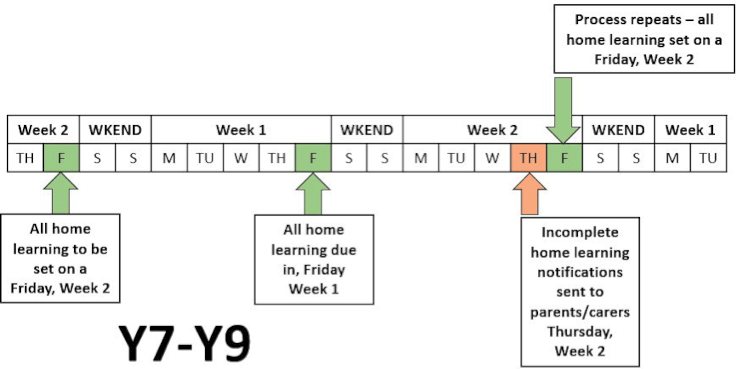
How Home Learning is set for Y10-Y11
To support students in Y10 & Y11 develop their revision routines, students are set home learning weekly on a Friday and due-in the following Friday*. The diagram below illustrates this.
*Home learning in Art might be collected on a different day dependent on individual students’ timetables. This will be made clear by classroom teachers.
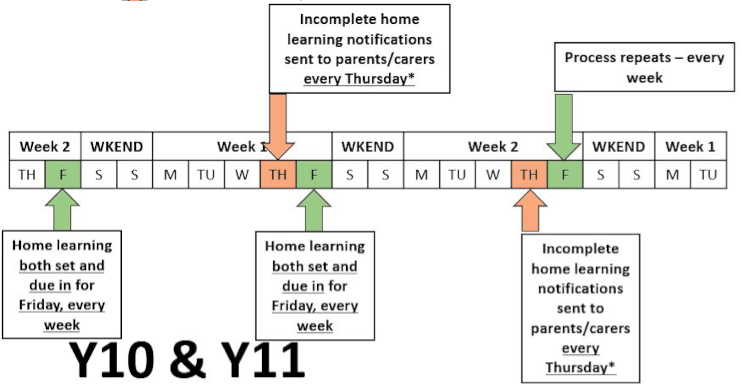
Accessing online platforms for home learning
Many subjects are set home learning using online platforms. All platforms should be accessed through the student hub linked here or on the homepage of the school website. To log into the Student Hub students, use their school username followed by ‘@horizoncc.co.uk’ and password. There are then direct links for students to click and students can use ‘Microsoft Single Sign-on’ meaning no other password is needed to access the platform. Specific platform information is displayed below:

Home Learning Club
Each week a Home Learning Club runs in college. This is staffed by teachers who can support students complete their Home Learning should they need it. Home Learning club runs from 3pm-4pm.
Monday in IT11
Wednesday in IT11
Thursday in IT11
How you can help from home
- Create a Home Learning timetable with your child to support them structure when they will complete their home learning across the week. Download a timetable by clicking here.
- Ensure regular opportunities for home learning are created throughout the week
- Ensure your child has the correct equipment needed to complete home learning
- Check your child’s planner for home learning deadlines
- Encourage your child to develop good study habits
- Check the quality and presentation of all home learning being returned to school
- Liaise with college should concerns arise
Intervention
Intervention
Our curriculum, delivered through high quality teaching, is designed to ‘challenge every learner, in every lesson, every day’. However, there may be times when we feel students would benefit from intervention, to help them secure the progress they are capable of.
Intervention will always be tailored to need and so will differ from student to student, from group to group and from year to year and it may be provided during lesson time or before/after the school day.
Within English, small group interventions has been provided during lesson time for students in both Years 10 and 11, whilst Maths have offered tuition to targeted groups of Year 10 students on a rolling programme. We also offer form period tutoring to Y11 students in the subjects of Maths and English. This takes place three times a week which provides each student with an extra hour a week of support.
All Year 11 students are offered an extensive intervention programme that runs throughout the year before and after school. This is optional for students to attend but they are encouraged to focus on key subjects where they may be under performing. All Year 11 students are also offered intervention support during our Easter School and May half-term revision sessions, both in-person and online, in a range of options subjects as well as English, Maths and Science.
Y8 students taking part in online tutoring through the MyTutor platform
The college continues to review its intervention and tuition offer regularly to make sure it is most effective for the students who need it. If we believe your child would benefit from an intervention or tuition, we will always contact you beforehand to discuss this.
Year 9 Options























